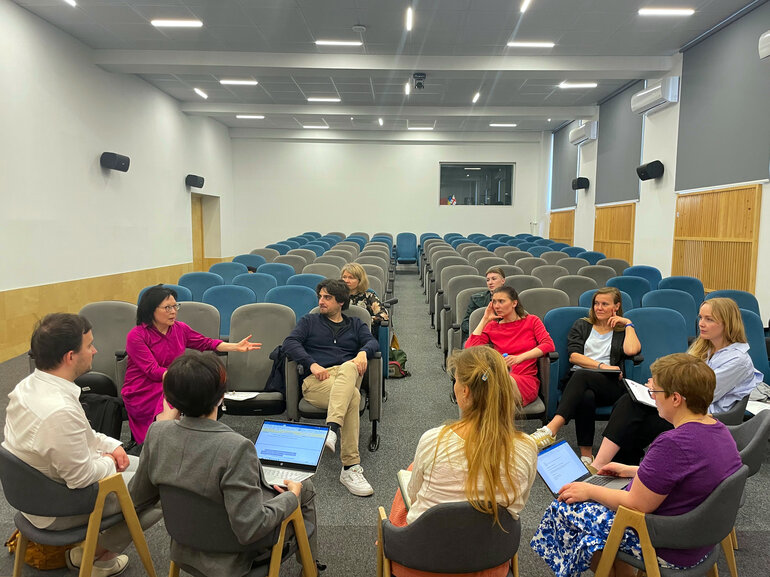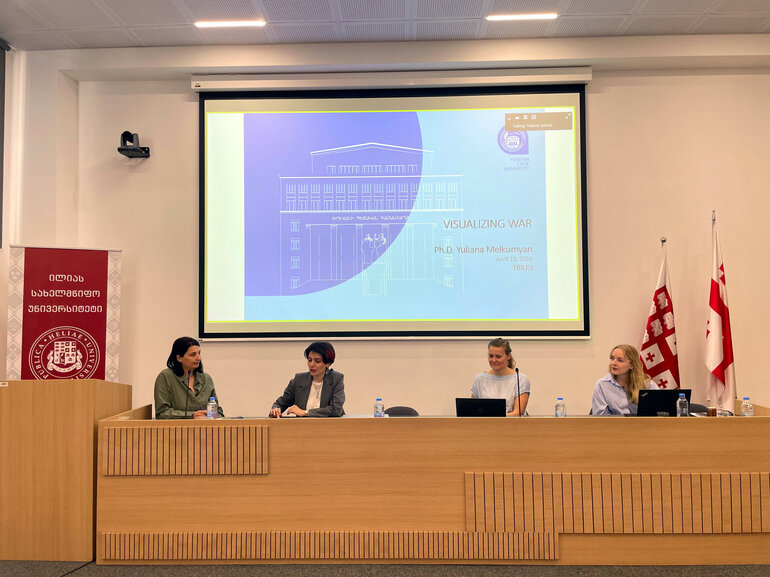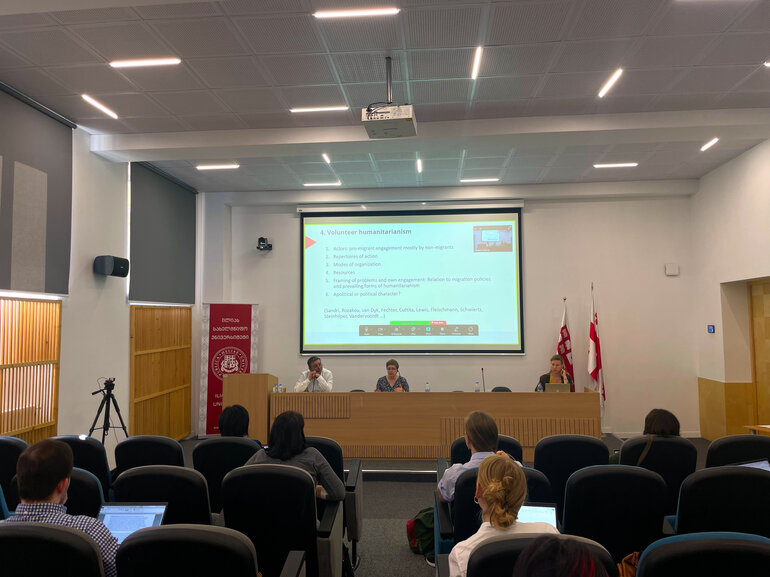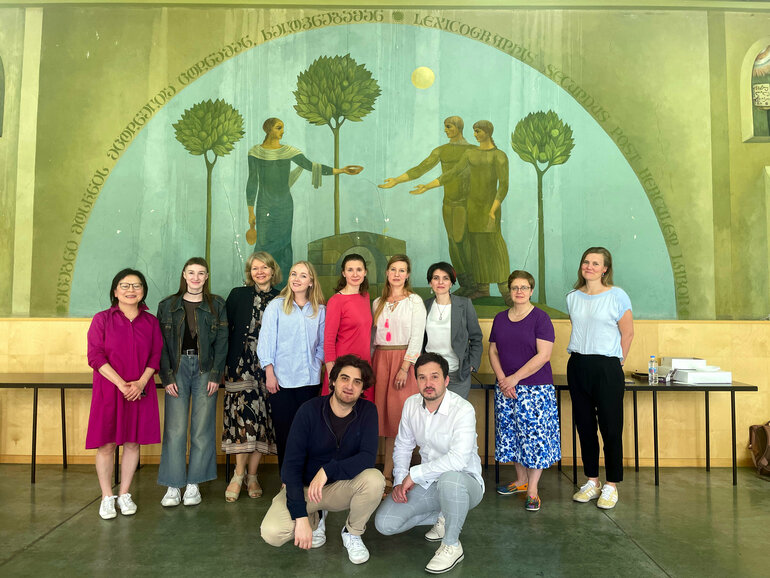Tbilisi Throwback: Members Look Back at the 1st ERDAM Workshop in April

On April 18–19, 2024, the ERDAM research network, co-funded by the German Peace Research Foundation (DSF), hosted its first workshop Zooming In, Zooming Out: Contextualizing Emerging Russian Diasporas and Anti-War Activism in Larger Europe at Ilia State University, Tbilisi. The event brought together scholars from various disciplines, including historians, anthropologists, sociologists, political scientists, and social workers, to explore the ongoing Russian migration and anti-war activism in the context of the Russian-Ukrainian war. The participants, from institutions across Europe, offered diverse perspectives and insights into how migration, activism, and geopolitical tensions intersect in today’s complex landscape.
Exploring Activism in Migration Contexts
The workshop kicked off with Panel 1: Activism between Policies and Politics, which examined the interaction between Russian migrants, host country policies, and the often politicized nature of activism. Tatiana Golova (ZOiS, Berlin) delivered a paper on Activism Related to the German Humanitarian Visa, addressing the complex interplay between neo-liberal and volunteer humanitarianism. She examined how activists help politically vulnerable civil society actors gain access to safety through informal networks, blending political and humanitarian imperatives in ways that blur traditional boundaries.
Similarly, Olga Bronnikova (University of Grenoble, France) focused on Helping Ukrainian Refugees in Georgia and the depoliticization of volunteer work. Drawing on Nina Eliasoph’s theory of the “evaporation of politics,” Bronnikova demonstrated how organizations, initially formed to provide humanitarian aid, shifted their focus to avoid political discussions, thus contributing to the depoliticization of humanitarian efforts. This was contrasted with the efforts of Russian volunteers, who navigate their identity and roles amidst growing cynicism and alienation.

Chairing this panel was David Darchiashvili (Ilia State University, Tbilisi), who facilitated a discussion on the inherent ambivalence in political activism and humanitarianism, and how these dimensions coexist and influence each other in the lives of Russian migrants.
Encounters Between Host Societies and Newcomers
In Panel 2: Encounters and Interactions Between Host Societies and Newcomers, researchers looked at how Russian newcomers interact with their host countries. Ketevan Gurchiani (Ilia State University, Tbilisi) discussed Global Brooklyn as an (Im)perfect Shelter in Tbilisi, offering insights into the experiences of Russian émigrés adapting to life in Georgia. Sofia Gavrilova (Leibniz Institute for Regional Geography, Leipzig) provided a nuanced Autoethnography of Russian Imperialism, examining how Russian migrants' own imperial history affects their perceptions and actions. Tsypylma Darieva (ZOiS, Berlin) added further depth by analyzing migration through the lens of north-south migration patterns, illustrating how Russian migrants adapt and integrate in diverse sociopolitical environments. This panel was chaired by Vadim Romashov (University of Eastern Finland, Kuopio).
Zooming In: Diversity and Inequality in War-Induced Migration
The afternoon sessions focused on Panel 3: Zooming In: Diversity and Inequality of War-Induced Migration, where Karolina Nugumanova (Scuola Normale Superiore, Florence) examined the gendered dimensions of Russian emigration and activism in her paper Cross-Border Voices. Kristina Jonutytė (Vytautas Magnus University, Kaunas) shared her insights from the Buryat diaspora in Mongolia, discussing languages of resistance and refusal among post-mobilization migrants. Ekaterina Chigaleichik (Exodus-22, Tbilisi) addressed The Dynamics of Inequality in the Russian Diaspora, highlighting the challenges and coping strategies of migrants facing economic and social disparities. This panel was chaired by Lela Chakhaia (Ilia State University, Tbilisi), who guided the discussion on how war-induced migration often deepens inequalities within the diaspora.

Visualizing War and Resistance
On the second day, Panel 4: Words and Visuals of War and Diasporic Resistance focused on the role of visual media in shaping public perception and activism. Yuliana Melkumyan (Yerevan State University, Yerevan) presented Visualizations of War: Propaganda and Anti-War Movements, examining how visual representations of the war are used to construct opposing narratives by European, Russian, and Ukrainian media. Her analysis of visual communication provided insight into how images can create tangible connections between distant events and audiences. This theme was further explored by Susanne Bygnes (University of Bergen, Norway) in her presentation on pro-democratic diaspora protests, and Katrine Stevnhøj (University of Copenhagen, Denmark), who delved into how Belarusian and Russian political exiles imagine future political identities through the lens of past experiences. This panel was chaired by Mariam Darchiashvili (Ilia State University, Tbilisi).
Zooming Out: A Broader Picture of Russian Migration
The final session, Panel 5: Zooming Out: Creating a Broader Picture, contextualized Russian migration within broader geopolitical and historical frameworks. Inta Mieriņa (University of Latvia, Riga) presented her research on The Dynamics of Inter-Ethnic Relations in Latvia, showing how Russia's aggression has impacted Latvia's Russian-speaking minority. Her data demonstrated that while many ethnic Russians identify as Latvian patriots, the war has fostered increasing internal divisions and a sense of alienation.

Vadim Romashov (University of Eastern Finland, Kuopio) explored The Interpellation of Decoloniality, focusing on how Russian wartime migrants in Georgia engage with decolonial narratives to reconcile their own complex identities. Finally, Giorgi Cheishvili (Tbilisi State University, Tbilisi) reflected on the Russian Exodus and how historical memories of past migrations shape contemporary experiences of displacement. Timothy Blauvelt (Ilia State University, Tbilisi) chaired this session, which provided a reflection on the interconnectedness of migration, history, and identity.
Looking Ahead
The workshop closed with a final discussion on the future of research on Russian migration and anti-war activism, particularly in light of ongoing geopolitical tensions. By bringing together scholars from institutions across Europe, the ERDAM workshop facilitated dialogue and collaboration, providing new insights into the evolving role of the Russian diaspora in international relations. With such a strong foundation, ERDAM's future research and events will aim to deepen the understanding of how diasporas act as mediators and influencers in global affairs, particularly in times of conflict.